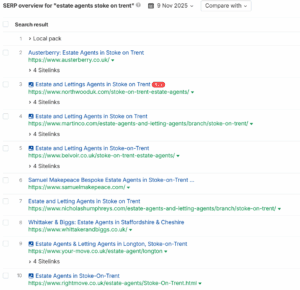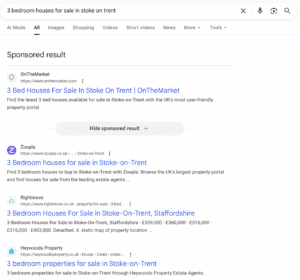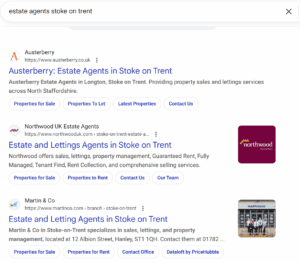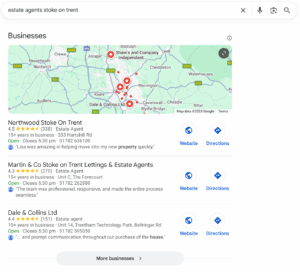
SEO for real estate: How to get started

Are you an estate agent looking to improve the online visibility of your property listings? Or maybe you’re looking for more leads when it comes to selling and renting out homes for others? If so, you’ve come to the right place.
In this blog, we break down what SEO for real estate is, how it can help your website and what steps you should take to improve the SEO of your real estate website.
Let’s dive in…
What is real estate SEO?
SEO stands for ‘search engine optimisation’, so real estate SEO is search engine optimisation for real estate websites, more commonly known as estate agents in the UK.
Search engines are sites like Google, Bing and DuckDuckGo, which are used to search for anything online, so search engine optimisation involves optimising your website so it can be found, crawled and ranked by these search engines.
Why does SEO in real estate matter?
Real estate SEO will help your estate agent website appear in the search results for your potential customers without the need to pay for ads or online directories like Zoopla.
Fully optimising your website will give you a higher chance of your site showing up on page 1 of the search engine results pages (SERPs) for your key search terms (think ‘houses for sale near me’ or ‘flats to rent in Manchester’).
Appearing here encourages more traffic to visit your site and potentially helps you achieve more leads in terms of viewings or visitors looking to sell or rent out their property, as the traffic you’re getting will be more relevant thanks to your targeted content, easy customer journey and website optimisations.
According to The Advisory, only 3-4% of people selling their home in 2023 used ‘online-only’ estate agents, including the likes of Purple Bricks. This low market share suggests that online visibility for traditional estate agents still matters a great deal as there’s still a huge volume of sellers searching for them.
Real-life example:

Let’s take the term ‘estate agents Stoke on Trent’. This has around 1100 monthly searches in the UK. Here’s the top 10 organic search results for that term:
We can see it’s a mixture of homepages – so those businesses are almost certainly based in Stoke-on-Trent – and location-specific pages, meaning those businesses have a wider reach but service the Stoke-on-Trent area.
This shows us that the sites with homepages on page 1 have worked hard on their local SEO to ensure they’re appearing for these types of local searches.
The sites with location-specific pages may not have a local office in the area – they may even be a national estate agent – but they’ve put effort in to create these pages in order to show up for searchers looking to buy, sell or rent a property specifically in Stoke-on-Trent, and will no doubt have many other pages for the different areas of the country that they service.
Without working on their real estate SEO, these estate agents would not be appearing on page 1 for this search term, and could therefore be missing out on a share of those 1100 site visitors every month, and that’s just for one keyword.
You’ve likely heard of the property portal Rightmove, which advertises properties on behalf of estate agents, but they must pay for the privilege. Whilst the site does appear in the top 10 for this search term, it’s at the bottom in position 10. Rightmove made £389.9 million in revenue in 2024, so if local companies can fend off the big boys for the top spot, it’s definitely worth a little time spent on SEO for your real estate website.
How to get started in real estate SEO
It can be daunting trying to figure out where to start when it comes to your SEO efforts, but fear not: we’ll take you through the main steps and considerations when it comes to stepping up your real estate SEO to help your site reach those all-important page 1 search results.
However, it’s important to remember that SEO is not an overnight fix – it’s a long-term process and can take time to ‘bed-in’, but it’s worth it for your business in the long run.
Keyword research
Researching key search terms for your estate agent website is one of the first and most important actions to take. Finding the search volume around local keywords helps you understand where the demand lies in terms of location and the types of terms potential customers are searching for, whether that’s ‘real estate’, ‘estate agents’ or ‘houses for sale in X’.
You can then tailor your pages, content and metadata accordingly to help you rank for the right keywords. You can use tools such as ahrefs or SEMrush for keyword research, and they’ll show you which of your competitors is currently ranking well for each.
You can also look for long-tail keywords, which are essentially longer phrases that tend to have a lower search volume, but the intent behind them is more specific and they tend to be easier to rank for than the shorter phrases.
An example would be ‘3 bedroom houses for sale in stoke on trent’: this has around 350 monthly searches, so not as many as ‘houses for sale stoke on trent’ with 6500 a month, but potentially more achievable in terms of competitiveness.
The traffic you would gain from this keyword would be more relevant, meaning you’d potentially obtain better quality leads as these customers know the type of property they’re looking for.
Looking at the search results for this keyword below, we can see the top result is a ‘sponsored result’ (so a paid ad), and the first two organic results are for property portals. In position 3, however, is a local estate agent, so these types of longer tail keywords could be achievable for other local estate agent websites.

Whilst you’re undertaking keyword research, it would be prudent to research local areas your business regularly services and the areas you’ve decided to create dedicated landing pages for. You could also research general property queries to understand online demand for them and whether it’s worthwhile providing the answers on your website.
This type of keyword research will assist in creating a blog content strategy to support your landing pages and provide opportunities for internal linking… but more on those later.
Get to know your competitors
Once you know which keywords to target and you’ve seen which competitors are winning when it comes to those keywords, you should spend time undertaking a competitor analysis, reviewing their sites and the SERPs to understand how they’re achieving these rankings and what they’re doing well.
However, copying competitors is a big no-no – Google will penalise your site if you copy any content – but taking inspiration from the best parts of each competitors’ sites can help you stand out above the rest. Whether it’s a call-to-action you like, an easy-to-use navigation structure or a particular type of content layout, it’s absolutely fine to let others inspire your site, but search engines appreciate effort so making an exact copy of an existing site or page will see your rankings plummet.
Optimise your website
Firstly, Google uses mobile-first indexing, which means it indexes the mobile version of your website ahead of the desktop version. And with Statcounter claiming 64.2% of UK traffic comes from mobile devices, it’s really important to have a well-designed mobile site that doesn’t differ too much from your desktop version. It should also be easy to navigate with a clear site structure, and the pages should load quickly for your users.
Next, use the keywords you found during your keyword research to create dedicated landing pages for your target areas, including the location in the URL. If there’s search volume around specific types of property in your local area(s), it could be worthwhile creating specific pages for those too. For example, ‘2 bed houses to rent stoke-on-trent’ gets around 100 searches a month, so there’s potential for a specific page.
On-page optimisation
Again, using the location keywords you found during your research, it’s now key to optimise those dedicated location pages for the target keyword and help both the user and search engines read your pages easily. This is called on-page SEO or on-page optimisation.
Page titles & meta descriptions
It’s really important to create eye-catching page titles and meta descriptions, as these are what your searchers will see within the SERPs (example below), and they tell the searcher and search engine what your page is about. You’ll also need to include your keyword in both of these elements.
The page title and meta description need to entice the searcher to click through to your site, so you should use persuasive language and include anything special or relevant to help. For example, mentioning any perks such as ‘First 3 days listing free’ or ‘Free credit check for renters’ could help the searcher choose you above your competitors.

Headings
Include the keyword in your page’s H1, which is the main title of the page and should explain what the page is about. You could also include variations of the keyword and the location name in H2s throughout your content. This also helps to break your content up into bitesize chunks for the reader and give it some structure.
Links
You should include internal links within your content to relevant or helpful pages to help create a ‘network’ of content for both the reader and search engines. This ties relevant content together and helps the likes of Google find its way around your site, and also provides the reader with links to further content to keep them on your website for longer. For real estate SEO, it would be prudent to include internal links to pages for areas surrounding those on the current page geographically, or any supporting blog posts related to the area.
Including external links to reputable websites to support the information on your website can also help add authority to your pages, whether that’s for statistics or information about the local area, for example.
Good technical site health
When we talk about Technical SEO, this involves all the nuts and bolts of your site. It includes everything from ensuring your pages are able to be crawled and indexed by search engines, to ensuring images and videos are optimised, to setting up your website for international audiences if needed.
We always recommend a technical audit of your website to ensure your technical site health or page load speed isn’t hampering your real estate SEO endeavours. It can flag any pages that aren’t linked to, any issues with canonicals, your XML sitemap or any duplicate content, even files that are too large so they’re affecting page speed.
Ensuring your site is technically sound will help with your rankings as it’s providing a good user experience and allowing your site to be crawled easily by search engines. It’s a huge but really important area of SEO, so to find out more details, visit our specialist Technical SEO page.
Work on your Local SEO
A key focus when it comes to selling and renting properties is location, and it’s no different when it comes to marketing your business. Local SEO is key for an estate agent or real estate business.
For the majority of location based searches, you’re likely to see what’s known as a ‘local pack’ or ‘map pack’ within the SERPs. This is usually shown above the traditional 10 ‘blue links’ and stands out in a box of its own with a map pinpointing each business’ location. Using the same keyword as in previous examples, here’s what you’d expect to see:

It goes without saying that this spot is the target. To help your business appear in this local pack for local searches, it’s important to claim your Google Business Profile and update it regularly to ensure the details are up to date and match what’s shown on your website. This helps avoid any confusion for both potential customers and search engines.
We’d also advise encouraging your customers to write more reviews for your business on Google. Having more positive reviews on your Google Business Profile can help improve your chances of showing up in the map pack. Even Google themselves have stated that positive reviews can have an impact on your local rankings. It also helps build trust and provides social proof that your business is real and you provide a great service.
If your business is listed on any online directories, it’s also key to keep those updated to ensure your contact information is consistent across the web. This provides trust signals for both search engines and your customers that your business is legitimate. There are more benefits to listing your business details on online directories, but more on that later.
Create a content strategy
Using your keyword research, it’s time to create a blog content strategy to support your dedicated landing pages for locations and types of property, and drive high quality traffic to your website.
As an expert in buying, renting or selling properties (or all three), you know the types of questions your customers usually ask and their pain points, so that could be a great place to start.
Providing the answers to general property queries could also pull in searchers who may not have come across your business otherwise, whether it’s around how much stamp duty they’d have to pay or the process for renting a property, for instance.
It could also be worthwhile creating informational content around the locations your estate agents services, to pull in those users who are earlier in their search journey. They might just be looking for some background around a certain town or city they’re thinking of moving to, for example, but might not be quite ready to look for a new home yet.
If you show up for these potential customers in the search results at this point, it provides more of a brand awareness benefit. However, they may remember your brand when it comes to selling, buying or renting a home and therefore choose you over the next competitor because you provided helpful information earlier in their search.
Creating useful blog posts provides you with ample opportunities for internal linking and helps to position your estate agent business as a property expert. It helps signal to customers that you understand their needs and they can trust you. Buying, selling or renting houses can be a pretty stressful experience so providing any local expertise you can is key.
A great link acquisition strategy
By listing your business name, address and contact information on online business directories, you’re supporting your Google Business Profile and website information, provided that all the information is correct and matches across the web.
However, as we mentioned previously, this can have more benefits than just supporting your local SEO. Using reputable and trusted directories can help boost your rankings by showing Google the authority your business has through the backlinks you achieve, so it’s important to choose the directories carefully. Quality, quantity and accuracy are all key factors.
You can also gain brand or image citations which are generally picked up more naturally, where a website may mention your brand name or use one of your images and ‘cite’ the source, providing a link back to your website.
Another way to acquire links to your website is through digital PR. A few examples of how backlinks could be achieved include:
- Releasing press statements around noteworthy business updates
- Providing expert commentary on news stories
- Supporting local charities
- Sponsorship of events or local teams
- Working with other relevant local businesses.
By working on these elements of digital PR, you can spread the word about your brand and potentially receive backlinks from any stories picked up in the media, or even from the charity or partner themselves.
Improve your E-E-A-T
We’ve talked a great deal about trust and authority, and that’s what Google’s E-E-A-T is all about – Experience, Expertise, Authority and Trust. Through strong local SEO, a well-performing, fast-loading website that is easy to use and full of useful, optimised content, and some authoritative backlinks from reputable sites, you’re showing Google and customers that your site can be trusted and building that authority.
To tackle the experience and expertise elements, you could list your employees, their experience and specialities, even link to their LinkedIn profiles, to help show customers and search engines that you have a real business with experts in their field.
Listing authors for each of your blog posts and linking through to their bios gives your posts more authority, as it helps to showcase your employees’ expertise and expert opinions, which builds trust with the reader.
You could also include customer testimonials or reviews on your website, or even include a full case study to show a real-life customer’s story and their experience working with you.
Track your success
SEO is an ever-changing entity and therefore, what might rank well one day, can drop down a few places the next, and this could really impact your website’s performance. It’s therefore important to monitor your success and make changes where needed if the dip is ongoing.
There are a high number of SEO tools out there to monitor your keyword rankings, organic traffic, technical site health and the number of conversions or leads generated through your website. Our recommendations include:
- Keyword rankings: ahrefs, SEMrush or SERanking
- Organic traffic: Google Analytics or Google Search Console
- Technical site health: Screaming Frog
- Conversions/leads: Google Analytics
Using these tools you can understand where rankings or traffic have fluctuated, and therefore which areas of your site might need some work, whether that’s small tweaks to the metadata or a full overhaul of the content on the page, or even some image optimisation to help your pages load faster for your users.
Embryo helps with your real estate SEO
As we’ve discussed, there can be so many areas to tackle when it comes to SEO for your real estate business that it can seem overwhelming if it’s not your full-time focus.
That’s where Embryo can help. Our SEO experts know how to tackle all of these elements on your behalf so you can crack on with your bread and butter – looking after your estate agent business and your clients. Get in touch with our team for a chat today and let us help you make the most of your online presence.



